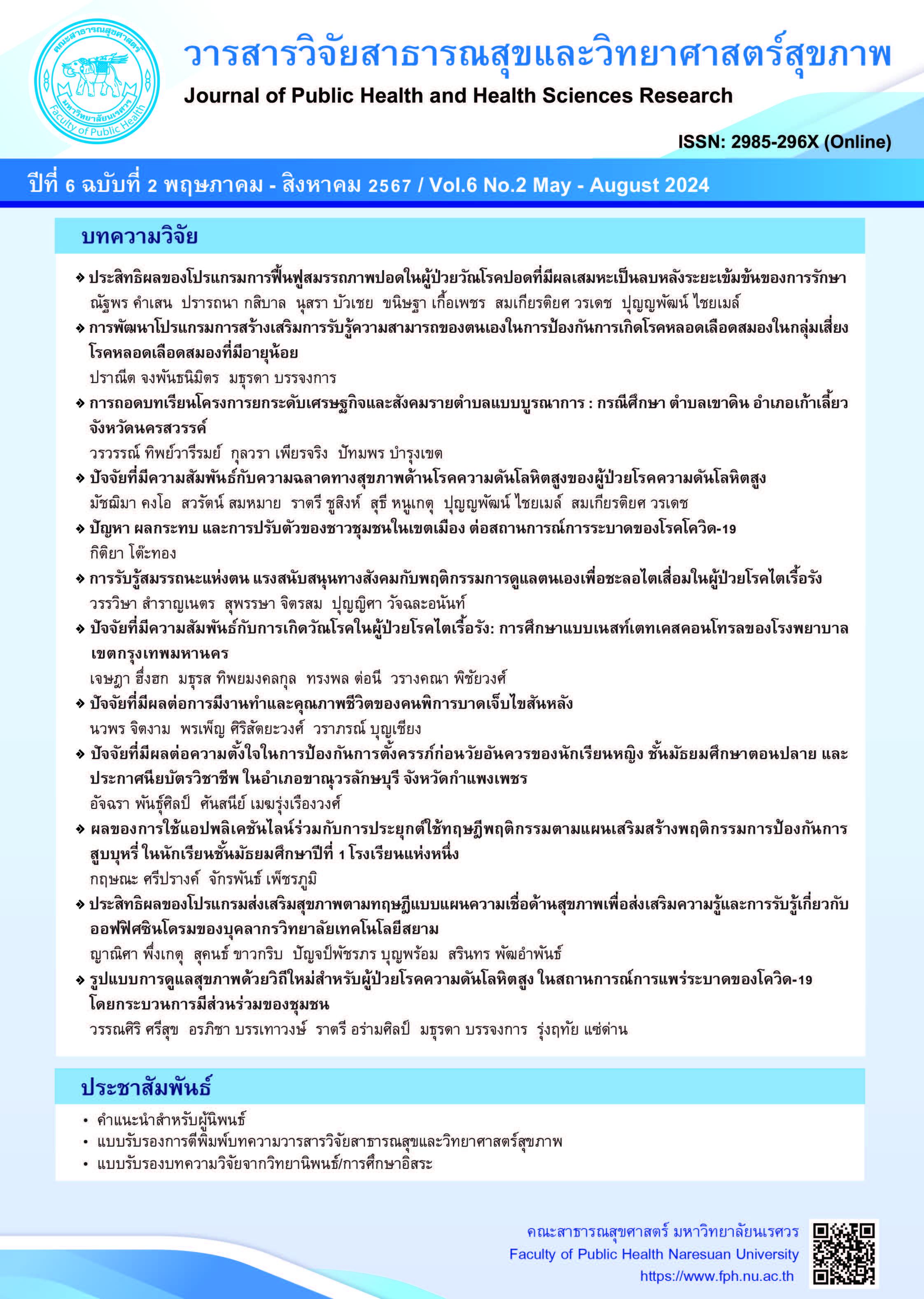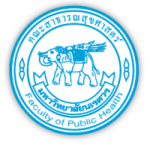Self-efficacy, social support, and self-care behavior in delaying the progression of kidney disease among chronic kidney patients
Keywords:
Self-care behavior, Self-efficacy, Social support, Chronic kidney diseaseAbstract
This predictive correlational research was to identify predictors of self-efficacy, social support, and self-care behaviors in delaying the progression of kidney disease among chronic kidney patients. A sample of 120 patients with chronic kidney disease, who received health care services at the non-communicable disease clinic of Non-Sung Hospital, Nakhon Ratchasima Province, was recruited using simple sampling. Data were collected using a questionnaire, which obtained 1) demographic characteristics, 2) self-efficacy, 3) social support, and 4) self-care behavior in delaying the progression of kidney disease among chronic kidney patients. Data were analyzed using descriptive statistics, Pearson's product-moment correlation, and multiple regression.
The results showed that 93.3% of the sample had overall self-care behavior scores at moderate levels. Self-efficacy and social support were positively correlated with self-care behaviors in delaying the progression of kidney disease among chronic kidney patients, statistically significant at 0.05 (r = 0.34, r = 0.47, respectively), and social support could predict self-care behaviors by 22.2%. Self-efficacy was unable to predict self-care behaviors in delaying the progression of kidney disease among chronic kidney patients. Therefore, the result suggests that healthcare providers and families should provide support for all aspects of information, emotional, appraisal, and instrumental for patients to be able to make appropriate self-care behavioral changes, which can delay the progression of chronic kidney disease.
References
Bandura, A. (1977). Self-efficacy: Toward a unifying theory of behavior change. Psychological Review, 84(2), 191-215.
Best.(1977). Research in education. New Jersey: Prentice Hall.
Chen, Y. C., Chang, L. C., Liu, C. Y., Ho, Y. F., Weng, S. C., & Tsai, T. I. (2018). The roles of social support and health literacy in self-management among patients with chronic kidney disease. Journal of Nursing Scholarship, 50(3), 265-275.
Chinnoros, S., Deepanya, C., & Phunsanawun, S. (2021). Social support and quality of life among end-stage renal disease hemodialysis patients. Journal of Phrapokklao Nursing College, 31(1), 43-50. (in Thai)
Doommai, N., Ponpinij, P., Muangkum, S., & Masingboon, K. (2022). Factors influencing behavior for delaying progression of kidney impairment among patients with chronic kidney disease stage 1-3. Thai Pharmaceutical and Health Science Journal, 17(4), 378-386. (in Thai)
Hanpaiboon, K., & Pratoomsoot, C. (2019). Factors influencing patients health behavior for delaying the progress in stage 3-4 chronic kidney disease patients at Khlongkhlung, Kampangphet Province. Thai Pharmaceutical and Health Science Journal, 14(2), 53-61. (in Thai)
House, J. S. (1981). Work stress and social support. New Jersey: Prentice Hall.
Jannoom, W., Rattanagreethakul, S., & Lawang, W., (2021). Factors influencing behaviors for delaying the progression of chronic kidney disease among diabetes persons, Chonburi Province. The Journal of Faculty of Nursing Burapha University, 9(1), 44-55. (in Thai)
Janthaporn, J., Soivong, P., & Phornphibul, P. (2019). Effect of a self-efficacy enhancement program on fluid overload management behavior and decreased glomerular filtration rate among persons with chronic kidney disease receiving non-renal replacement therapy. Nursing Journal of the Ministry of Public Health, 29(3), 66-79. (in Thai)
Janthapuek, J., & Chopsiang, L. (2020). Relationships between health literacy and self-care behavior to delay the progression of chronic kidney disease among patients with chronic kidney disease stages 1 and 2. Regional Health Promotion Center 9 Journal, 14(34), 243-158. (in Thai)
Jirubapa, M. (2014). The slowly progressive chronic kidney disease from adult to elder persons. The Journal of Boromarajonani College of Nursing, Nakhonratchasima, 20(2), 5-16. (in Thai)
Juntachat, A., Meepan, M., & Jabprapai, P. (2018). The development of the self-management program for diabetes mellitus patients with third stage chronic kidney disease. Journal of Preventive Medicine Association of Thailand, 7(3), 280-291. (in Thai)
Krajachan, S., Duangpaeng, S., & Masingboon, K. (2018). Factors associates with self-management behaviors among patients with chronic kidney disease stage 1-3 in Trat Province. Journal of Boromarajonani College of Nursing, Bangkok, 34(1), 14-22. (in Thai)
Lai, P. C., Wu, S. F. V., Alizargar, J., Pranata, S., Tsai, J. M., & Hsieh, N. C. (2021). Factors influencing self-efficacy and self-management among patients with pre-end-stage renal disease (Pre-ESRD). Healthcare, 9(3), 266.
Maneesri, S., Masingboon, K., & Chaimongkol, N. (2023). Effectiveness of individual and family self-management combined health program for people with stage 3 chronic kidney disease: A randomized controlled trial. Pacific Rim International Journal of Nursing Research, 27(1), 169-184.
Moktan, S., Leelacharas, S., & Prapaipanich, W. (2019) Knowledge, self-efficacy, selfmanagement behavior of the patients with pre-dialysis chronic kidney disease. Ramathibodi Medical Journal, 42(2), 38-48. (in Thai)
Mousa, I., Ataba, R., Al-ali, K., Alkaiyat, A., & Zyoud, S. H. (2018). Dialysis-related factors are affecting self-efficacy and quality of life in patients on hemodialysis: A cross-sectional study from Palestine. Renal Replacement Therapy, 4(21), 1-12.
Paypat, S., Pakdevong, N., & Binhosen, V. (2021). The association among knowledge, self-efficacy and self-management behavior in patients with chronic kidney disease. APHEIT Journal of Nursing and Health, 3(2), 22-36. (in Thai)
Pochai, S., Kingkeaw, J., & Yomsriken, N. (2022). Self-management behavior of chronic kidney disease patients without dialysis treatment level 1-4 in Pho, Nongkaew and Phonkhwo Sub-District, Mueng District, Sisaket Province. Journal of Sakon Nakhon Hospital, 25(3), 48-57. (in Thai)
Suwanpukdee, P., & Wangwonsin, A. (2021). Factor affecting self-care behavior for delaying the deterioration of chronic kidney disease among type 2 diabetic patients, Plakraet Sub-District, Bang rakam District, Phitsanulok Province. Disease Control Journal, 47(1), 665-663. (in Thai)
Thungtong, S. (2017). Delayed progression diabetic nephropathy in patients with uncontrolled type 2 diabetes mellitus. Journal of The Royal Thai Army Nurses, 18 (supplement), 17-24. (in Thai)
Unaphak, P. & Rattanamanee, K. (2015). The correlation factors of self-care behaviors to prevent complications among patients with chronic kidney disease at Somdet phraphutthalertla Hospital in Samut Songkhram Province, The Public Health Journal of Burapha University, 10(2), 44-54. (in Thai)
Vorapo, N. (2020). Factors affecting preventive behaviors in preventing diabetic kidney disease of diabetic patients in Thapthan district, Uthaitani Province. Thesis of Master of Public Health, Naresuan University, Phitsanulok. (in Thai)
Wu, S. F. V., Hsieh, N. C., Lin, L. J., & Tsai, J. M. (2016). Prediction of self care behavior on the basis of knowledge about chronic kidney disease using self efficacy as a mediator. Journal of clinical nursing, 25(17-18), 2609-2618.
Yoomuang, P., & Suphannakul, P. (2023). Factors predicting self-management behavior among patients with chronic kidney disease stage 3 in Suphanburi Province, Thailand, Malaysian Journal of Public Health Medicine, 23(1), 272-278.
Downloads
Published
How to Cite
Issue
Section
License
Copyright (c) 2024 Journal of Public Health and Health Sciences Research

This work is licensed under a Creative Commons Attribution-NonCommercial-NoDerivatives 4.0 International License.
The published article is copyrighted by the Journal of Public Health and Health Sciences Research.
The statements that appear in each article in this academic and research journal are the personal opinions of each author and are not related to Naresuan University and other faculty members in the university. Responsibilities regarding each article are the responsibility of each author.






